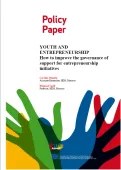How to Improve the Governance of Support for Entrepreneurship Initiatives

SAHWA Policy Paper, nº. 3
ISSN 2564-9167
ore than two decades now, entrepreneurship has been favoured by successive Moroccan policymakers. The country’s demographics and economic difficulties have led to a high level of youth unemployment and the creation of revenue-generating ventures has been considered a great opportunity to facilitate youth transition to work and to enhance job creation. In the MENA region, as elsewhere, “it is the young and most productive firms that create more jobs” (World Bank MENA Development Report, 2015). Nevertheless, agriculture remains the main employer in the country (39% of the workforce), the creation of new ventures in services or production offer huge opportunities for growth and job creation.
This paper is based on the work carried out by the SAHWA Project’s Moroccan team, who studied young people’s transitions to work and formal or informal entrepreneurship. Part of the study focused on native entrepreneurs. We have therefore been able to organise focus groups both with stakeholders supporting youth entrepreneurship and with entrepreneurs. In addition, our ethnographic work enabled us to focus on several entrepreneurs and structures that support entrepreneurship.